Tips to Improve GK Section for MBA Entrance Exams
Improve GK Section for MBA Entrance Exams

To prepare for the General Knowledge component of the CMAT, IIFT, and XAT, it is crucial to have the appropriate sort of plan. In the General Knowledge portion, questions often cover a wide range of topics, including current events, social concerns, awards, world summits, national and international politics, sports, and entertainment. It is equally crucial to prepare for the GK section because it accounts for 15–25% of the exam's weight. Candidates who are studying for the MBA entrance exams will learn how to prepare for the GK component of the CMAT, IIFT, and XAT in this article.
Table of Contents
- 10 ways to prepare the GK section for the MBA entrance Exam
- Why concentrate on the section on general Knowledge?
- 10 top tips to prepare for the GK section for MBA Entrance Exam
- Know the GK Section Curriculum
- Know how much is GK weighing in the MBA entrance exam
- Select GK Textbooks for the MBA Entrance Exam
- Clustering of Areas
- Daily knowledge of current events is a must
- Questions on business and economics for the GK portion of the IIFT, CMAT, and XAT
- IIFT International Affairs
- Take practice exams and a GK quiz online
- One question can change into several questions
- Revising quickly towards the end of the day
- Conclusion
- Frequently Asked Questions
Why concentrate on the section on general Knowledge?
MBA candidates frequently ignore the General knowledge section, or they don't study as diligently for it as they do for the other traditional sections like Quant, DILR, and VARC. This is a serious error on the part of the test-takers because, in contrast to questions on traditional subjects, general knowledge questions are frequently straightforward and have clear-cut solutions. Therefore, it is quite simple for test-takers to solve or respond to them. When it comes to general knowledge questions, there is no room for ambiguity, problem-solving, or sneaky techniques. Since doing well in the GK part is significantly simpler than doing well in the other sections, it should be given the same weight as other main-stream sections.
10 top tips to prepare for the GK section for the MBA Entrance Exam
Here are some tips that would help the candidates to ace the General Knowledge section in the above-mentioned exams:
Know the GK Section Curriculum
Before beginning to study, aspirants must fully comprehend the GK section of the syllabus for each MBA entrance test. With a few exceptions, the general knowledge test syllabus is the same for all of the exams.
Know how much is GK weighing in the MBA entrance exam
The International Institute of Foreign Trade entrance exam, as well as CMAT and XAT, includes at least 15 to 25 questions.
Important Areas to Prepare for GK
Since the general knowledge part is extremely broad and as large as an ocean, applicants should prepare ahead by studying the following subjects:
- Current Events & Social Concerns
- Changes in fiscal and monetary policy in business and economics
- Wings, HQs, Agencies, and Abbreviations of the UN
- Events & International Current Affairs
- World Summits
- Capital, eminent development, and currency of many nations
- Indian Constitution and recent revisions
- most recent Who's who
- National, international, and award days
- Questions about General Science, Geography, and History Books, Authors, and Brand Logos
Select GK Textbooks for the MBA Entrance Exam
The following study material recommended by top IIFT, CMAT, and XAT scorers to get ready for the GK section of the MBA entrance test are here.
- Candidates should study The Economist, Business Standard, and Economic Times as they get ready for the MBA admission test.
- Candidates must also study Manorama Year Book, which is advised by experts and the top scorers on the MBA admission test.
Clustering of Areas
Aspirants should split the topics from which they expect the questions part before beginning their GK preparation since it would greatly assist them in further classifying the various question kinds. The two main categories of GK are static knowledge and current affairs. The questions in the current events area cover topics including business and economics, international affairs, government plans and programs, and how they are put into action, awards, and honors. The questions in the static gk section mostly include countries and capitals, currencies, books and authors, the United Nations, and sports.
In order to adequately cover the section on national and international current events. Candidates must make sure they read national newspapers and listen to Doordarshan news as there are important policy-related announcements there. Additionally, regularly reading the newspaper can provide candidates with a better understanding of new positions in various fields.
Daily knowledge of current events is a must
Candidates should regularly practice current affairs questions from a variety of themes to stay up to speed on global events. One of the finest methods to get ready for current events questions is to take notes from the daily newspaper. Making these notes won't just aid applicants in memorizing what they have learned. They will also provide them the chance to review throughout the final preparation.
Questions on business and economics for the GK portion of the IIFT, CMAT, and XAT
In tests like the IIFT, CMAT, and XAT, the GK section has a sizable portion of questions pertaining to business and economics. The majority of the inquiries include economic policies, changes in business and industry, and recent business news, such as "who's who," "business awards & honors," company logos and performance, etc. Candidates can get ready for this portion by reading business journals, newspapers, etc., and browsing relevant business websites, among other things.
IIFT International Affairs
Important recent worldwide events are referenced in some of the GK questions on the CMAT, IIFT, and XAT tests. Candidates might learn from well-known worldwide news websites, which offer accurate and authentic news as well as in-depth information, as they become ready for global events. Therefore, it is crucial for the candidates to often visit these websites. Check to see if any new international treaties have been signed. And learn who the signatories were, and so on.
Take practice exams and a GK quiz online
Candidates should regularly take mock tests based on the General Knowledge component of the examination to prepare for the GK section of the CMAT, IIFT, and XAT exams. This will enable students to assess their level of preparation for the admission exam and the amount of additional work they will need to do. Candidates must take quizzes on a regular basis since doing so will allow them to increase their general knowledge.
One question can change into several questions
In order to gain more knowledge on that topic. Candidates should create as many additional questions as they can from a single question if they are to select one from a specific topic during their preparation for the GK section. This should be done while taking notes or answering questions throughout the GK section preparation. As an illustration, consider a scenario in which a question about foreign politics and the response is the name of a certain nation. Candidates should choose the appropriate country, but they should consider other details about that nation, like its capital city, official language, current leader, and other details.
Revising quickly towards the end of the day
We are aware that frequent revision is necessary if you want to remember something for a very long period. Therefore, it goes without saying that whatever notes you take each day, you must revise each night before bed. Having all of the answers at their fingertips will undoubtedly be helpful.
Conclusion
We can see that the general knowledge (GK) portion carries a significant weight across many entrance tests. Hence this area cannot be left unseen. This section needs to be the main emphasis. However, the most crucial query is how to approach this portion. The greatest method to stay current with events. Both in India and throughout the world. For all entrance examinations, reading and practicing are the keys to success in the general knowledge portion. Be diligent and goal-oriented, and you will succeed!
Frequently Asked Questions
Q. Which MBA admission test in India receives the most applicants?
Ans. The IIM's Common Admission Test, or CAT, is regarded as India's top MBA admission test. In 150 places throughout India, CAT 2023 exam will take place on November 26. Registration will open in August. In addition to CAT, the top MBA entry tests are XAT, CMAT, and MAT.
Q. Which MBA admission exam is the easiest?
Ans. Compared to other MBA entry examinations, the CMAT and MAT tests often have a lesser degree of difficulty. Candidates should not, however, take any test lightly because it demands extensive study.
Q. What is the MBA entrance test syllabus?
Ans. The quantitative aptitude, data interpretation, logical reasoning, English comprehension, and general awareness themes on the MBA entrance test syllabus. There are no General Awareness components on the CAT test.
Q. Which state-level MBA entry tests are the best?
Ans. The MAH CET for Maharashtra, TSICET for Telangana, TANCET for Tamil Nadu, APICET for Andhra Pradesh, KMAT for Karnataka, KMAT Kerala for Kerala, DAVVCET for Madhya Pradesh, UPSEE for Uttar Pradesh, HPU MAT for Himachal Pradesh, and OJEE for Odisha are some of the top state-level MBA entrance exams.
Q. Do all MBA admission tests take place online?
Ans. All of the main MBA admission examinations are taken online, however, a few university and state entrance exams, including the Karnataka PGCET and VMOU MET, are taken on paper. MAT uses both online and offline modalities.
About the Creator
Vartika Sharma
I am Vartika, an experienced educator at Infinity Learn. In the role of a teacher, I find immense fulfillment in not only imparting knowledge but also in instilling a passion for learning that extends beyond the confines of textbooks.






Comments
There are no comments for this story
Be the first to respond and start the conversation.